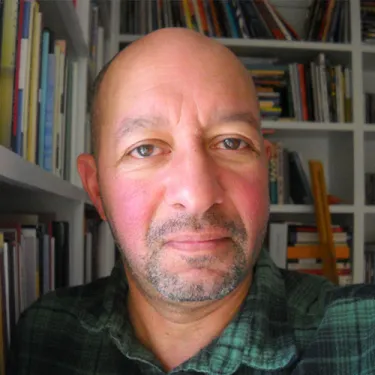Carl Phillips
Visiting Poet

Carl Phillips reanimates the darkness and silence of the stories that imperceptibly shape us. Trained as a classicist at Harvard and the University of Massachusetts, Phillips plumbs human myths and social narratives in order to explore what Booklist has called “the tension between love, belief, and reason.” With irreverent intelligence and rigorous formality, his poems make the mythical resonate at a modern and human frequency. “Myths are unsheathed and glisten,” writes the poet and critic J.D. McClatchy. “History is held and pondered. Violence shimmers, desires are silhouetted against the light of love and death.”
Phillips’s tightly-controlled poems are studies in deliberate contrast: grounding abstract language with visceral and evocative imagery; enlisting the broad landscape of history and mythology as the staging ground for considerations of contemporary life; making space for the consideration of desire, intimacy, faith, and resistance among an epic formality. Writes The Chicago Tribune, “Phillips is a poet unafraid to address the oldest lyric concerns: how to sing the beloved, how to sing his passing, how to honor the unruly, demanding ethic of love. His poems are acts of attention; their exquisite observations render the world a space for epiphanic encounter.”
The author of seven books of poetry, Phillips’s many awards include a Guggenheim Fellowship, two Pushcart Prizes, the Academy of American Poets Prize, and membership in the American Academy of Arts and Sciences. His poems, essays and translations have appeared in such journals as The Nation, The Paris Review and The Yale Review. His most recent collection, The Rest of Love, was a finalist for the 2004 National Book Award. He is a professor of English and African and African American Studies at Washington University in St. Louis.
Select Poems
He has made me to know,
in myself, a compassion I have
no use for.
He fairly breaks-as they say-my heart.
He passes into and free of the light,
the light itself
trophaic in its semblance
of taking leave.
Clouds;
late fog;
he has caused me to understand
and record
the difference,
as between the sea when
it seems mostly a delicate, black
negotiation
and the sky at night when it wants
for stars.
Wild bird
at rest
in the very hand to which it once was blur
entirely,
all resistance-
Had I not
called it a thing done with
already, the better part
of pleasure? Did he not find me
lying still
in the part at least I had thought
to keep?
From ROCK HARBOR (Farrar, Straus and Giroux, 2002)
There is a difference it used to make,
seeing three swans in this versus four in that
quadrant of sky. I am not imagining. It was very large, as its
effects were. Declarations of war, the timing fixed upon for a sea-
departure; or,
about love, a sudden decision not to, to pretend instead to a kind
of choice. It was dramatic, as it should be. Without drama,
what is ritual? I look for omens everywhere, because they are everywhere
to be found. They come to me like strays, like the damaged,
something that could know better, and should, therefore-but does not:
a form of faith, you’ve said. I call it sacrifice-an instinct for it, or a habit
at first, that
becomes required, the way art can become, eventually, all we have
of what was true. You shouldn’t look at me like that. Like one of those
saints
on whom the birds once settled freely.
From THE REST OF LOVE (Farrar, Straus and Giroux, 2004)
Sir,
the flies assemble
like so many parts of a working argument
around what proves it. No sign, not yet,
of the rains you spoke of. -Will they come,
ever?
It’s day, mostly. The light
extends like truth, the truth like
a hand extending at the same time as
it recedes.
What is that like?
One moment, I’m a pitcher of
milk tipped dangerously forward; the next,
a band of pilgrims, pilgriming
toward the latest report: pieces of heaven again-
here, on earth.
Between tenderness
and violent force, if the choice is easy,
why then does each seem equally, with the same
persuasiveness, a form of luck
beneath which-
beneath which, I
should know better?
In the meadow, in
adoration: am I not yours?
From THE REST OF LOVE (Farrar, Straus and Giroux, 2004)